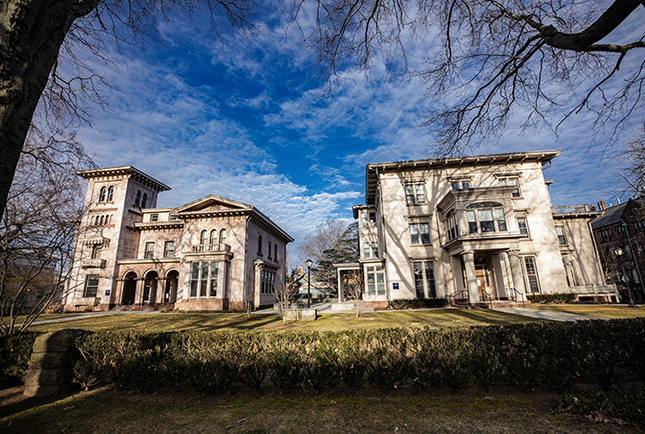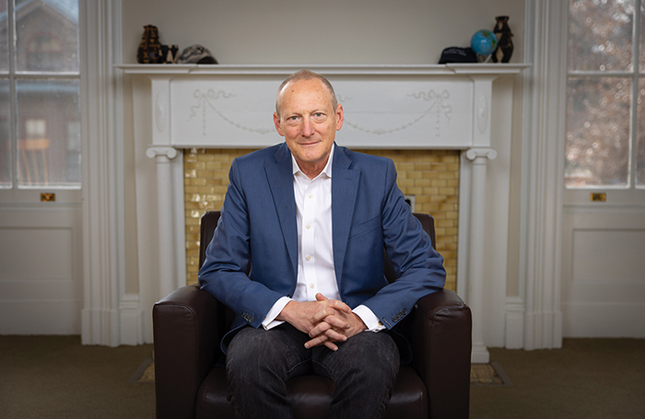
Dan Renzetti
The Jackson School will expand into two Hillhouse Avenue mansions across from its present home.
View full image

Dan Renzetti
The Jackson School will expand into two Hillhouse Avenue mansions across from its present home.
View full image

Dan Renzetti
James Levinsohn, currently director of the Jackson Institute, will be the school’s first dean.
View full image

Dan Renzetti
James Levinsohn, currently director of the Jackson Institute, will be the school’s first dean.
View full image
When James Levinsohn bikes to work on July 1, he’ll be headed to the same office at 55 Hillhouse Avenue, but he’ll have a new title at a new institution. That’s the day he goes from being the director of the Jackson Institute for Global Affairs to the inaugural dean of the Jackson School of Global Affairs—Yale’s 13th professional school, and the first new one since the School of Management was founded in 1976.
Since the Jackson Institute was launched in 2010 with a $50 million gift from John Jackson ’67 and his wife Susan, it has offered courses and degree programs in global affairs taught by faculty from other Yale departments and schools. In 2019, Yale said that the institute would become a school in 2022 if $200 million in new funding could be raised. In January, President Peter Salovey ’86PhD announced that the goal had been reached and that Levinsohn, an economist who has been director of the institute since its founding, will be the school’s dean.
“Yale has traditionally educated students for leadership and citizenship, including global leadership and citizenship,” says Pericles Lewis, who has been involved in the school’s creation as vice president for global strategy, “and I think people recognize that that’s something we can do even more effectively as a school.”
The school’s main offering will be a two-year master of public policy (MPP) degree in global affairs for about 35 to 40 students per year. (Until now, it has offered a master of arts through the Graduate School, but the MPP is a more recognizable professional degree.) Levinsohn says that of the program’s graduates so far, about a third go to work in government, a third to NGOs, and a third to the private sector. “Our students have been getting phenomenally great job offers,” he says. “The institute already has a reputation for turning out incredibly talented people.”
Jackson also offers a master of advanced study in global affairs for mid-career professionals, as well as an undergraduate global affairs major. (A five-year combined BA and MPP program is in the works.) And MPP students can pursue joint degrees in Yale’s schools of environment, law management, and public health.
Those joint-degree programs highlight what Yale thinks will set Jackson apart from its competitors: its integration with and accessibility to Yale’s professional schools and arts and sciences faculty. “We compete most intensively for students with Harvard and Princeton,” Levinsohn notes. “Harvard of course has a wonderful portfolio of professional schools, but if you’re at the Kennedy School, it’s not necessarily all that easy to take courses at the law school or the business school.”
Princeton, where Levinsohn got his master of public administration degree and PhD, is more integrated with the arts and sciences faculty, he says, but it doesn’t have the complement of professional schools that Yale has.
One of the main tasks before the school opens is to assemble a tenure-track faculty for the school. Until recently, most of the teaching was done by faculty with primary appointments in the Faculty of Arts and Sciences, especially in the history, economics, and political science departments. Jackson has hired about a dozen new professors and hopes to have another three on board by fall. Ultimately, Levinsohn expects about 30 tenure-track faculty and some other non-tenure-track instructors.
Among the latter are a dozen or so Senior Fellows. The fellows and the depth of their engagement are another thing that sets Jackson apart, says Levinsohn: “Lots of places have phenomenal people who come and give a talk at four o’clock, but they’re on the Acela to home by seven.” Jackson’s Senior Fellows are practitioners from the global policy world, such as John Kerry ’66, David Brooks, and Howard Dean ’71, and rather than a talk per semester, they teach semester-long courses.
Although the sign on the front of the building will change in July, the process of building the school and its reputation has been going on for years—successfully, Levinsohn says, in terms of recruiting both faculty and students. “My goal is to open the number-one best-in-class school of global affairs out of the gate,” he says. “And I think that’s completely doable.”
 loading
loading